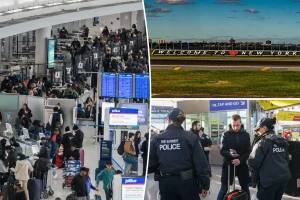Israel’s President Takes Hard Line on Palestinian Statehood While Calling for Hostage Release
Presidential Address Echoes Across Gaza as Conflict Intensifies
In a dramatic escalation of diplomatic rhetoric that reverberated both literally and figuratively across the Gaza Strip, Israel’s president has categorically rejected the prospect of Palestinian statehood while forcefully defending his nation’s ongoing military campaign. The president’s address, which was deliberately broadcast via loudspeakers into Gaza in an unprecedented attempt to communicate directly with Hamas captors, underscored Israel’s unwavering position on two critical issues that have come to define the current conflict: the imperative of hostage recovery and opposition to Palestinian sovereignty.
The president’s speech marks a significant hardening of Israel’s official position at a time when international pressure for a two-state solution has intensified amid the humanitarian crisis unfolding in Gaza. “Let me be absolutely clear,” the president declared in his address, which echoed across bombed-out neighborhoods and refugee encampments. “Israel cannot and will not accept the establishment of a Palestinian state under the current circumstances.” This unequivocal rejection comes as world leaders, including key allies, have repeatedly emphasized that a two-state solution remains the only viable path toward lasting regional stability. The president’s stance reflects growing sentiment among Israel’s right-wing coalition government that security concerns supersede Palestinian aspirations for statehood, particularly in the aftermath of the October attacks that triggered the current conflict.
The Human Cost of Conflict and the Hostage Imperative
The emotional centerpiece of the president’s address focused on the plight of Israeli hostages still held in captivity since Hamas’ surprise attack. “To those holding our citizens: Hear my words clearly. The return of every hostage is non-negotiable and represents our highest national priority,” the president stated, his voice carrying across the rubble-strewn landscape of Gaza through military-grade speaker systems. Intelligence reports suggest approximately 130 hostages remain in Hamas custody, though the exact number of those still alive remains uncertain. The president’s decision to broadcast directly into Gaza represents a novel psychological approach in the ongoing hostage crisis—combining public pressure with an implicit message that Israel’s military operations will continue unabated until all captives are released.
Families of hostages have maintained relentless pressure on the Israeli government to prioritize the safe return of their loved ones, organizing weekly demonstrations in Tel Aviv that have drawn tens of thousands. “Every day that passes with our family members in captivity is unbearable,” said Rachel Goldstein, whose 23-year-old son was taken during the initial attack. “We need more than words broadcast over loudspeakers—we need concrete action.” The president acknowledged these concerns, detailing ongoing negotiations through Egyptian and Qatari intermediaries while asserting that military pressure remains essential to creating conditions for successful hostage recovery. “History has taught us that Hamas responds only to strength,” he emphasized, defending the dual-track approach of diplomatic engagement backed by military operations.
Defending Military Operations Amid International Scrutiny
Throughout his address, the president vigorously defended Israel’s military campaign, which has faced mounting international criticism over civilian casualties and infrastructure destruction. “Israel exercises its inherent right to self-defense with unprecedented care for civilian life,” he insisted, citing extensive warning systems, evacuation notices, and precision targeting protocols. This defense comes as humanitarian organizations report devastating civilian impact, with Gaza’s health ministry documenting over 25,000 casualties since the conflict began. The president characterized these figures as “regrettable but unavoidable consequences” of Hamas’ strategy of embedding military assets within civilian infrastructure—a claim Hamas officials consistently deny.
International human rights organizations have increasingly called for independent investigations into potential violations of international humanitarian law by both sides. Amnesty International recently published a comprehensive report documenting incidents where civilian targets, including hospitals, schools, and UN facilities, appear to have been struck without clear military justification. When questioned about these allegations, the president responded, “No army in history has gone to greater lengths to minimize civilian harm while fighting an enemy that deliberately uses its own population as human shields.” Military analysts remain divided on this assessment, with some acknowledging Israel’s warning systems while others questioning the proportionality of force employed in densely populated areas. The continuing debate reflects the profound ethical and legal questions surrounding urban warfare against non-state actors—questions that have no simple resolution in the complex landscape of international law.
Implications for Regional Stability and Peace Prospects
The president’s categorical rejection of Palestinian statehood represents a significant obstacle to diplomatic initiatives aimed at resolving the decades-long conflict. Veteran diplomats warn that foreclosing the possibility of eventual Palestinian sovereignty undermines moderate Palestinian voices while potentially strengthening extremist elements. “By eliminating the prospect of statehood, Israel risks creating a vacuum that will inevitably be filled by more radical alternatives to Hamas,” noted former US Middle East envoy Daniel Silverman. “A political horizon remains essential, even amid the current security challenges.”
Regional experts point to the broader geopolitical implications of Israel’s hardened position. The Abraham Accords, which normalized relations between Israel and several Arab states, were predicated on the understanding that Palestinian aspirations would eventually be addressed through diplomatic channels. Saudi Arabia, widely seen as the ultimate diplomatic prize for Israel, has consistently maintained that normalization depends on meaningful progress toward Palestinian statehood. “The president’s remarks effectively place the broader normalization process on indefinite hold,” explained Dr. Leila Hadad, professor of Middle Eastern Studies at Columbia University. “This represents a strategic gamble that military victory over Hamas will ultimately create new diplomatic realities—a highly uncertain proposition given the region’s complex history.” Meanwhile, Iran and its proxies have seized upon the president’s rejection of Palestinian statehood as evidence supporting their narrative that Israel has no interest in a just resolution to the conflict, potentially complicating security dynamics throughout the Middle East.
The Path Forward: Humanitarian Concerns and Diplomatic Imperatives
As the conflict enters its fourth month with no immediate end in sight, humanitarian conditions in Gaza have deteriorated to catastrophic levels. The UN describes an unprecedented crisis, with over 85% of Gaza’s 2.3 million residents internally displaced, critical shortages of food, water, and medicine, and a healthcare system on the verge of total collapse. The president acknowledged these concerns while placing responsibility squarely on Hamas: “The suffering in Gaza could end tomorrow if Hamas releases all hostages and surrenders its weapons.” This framing, however, provides little immediate relief to civilians caught in the crossfire.
The international diplomatic community remains actively engaged in pursuing both immediate humanitarian improvements and longer-term political solutions, despite the seemingly intractable positions of the principal parties. UN Secretary-General António Guterres has called for an immediate humanitarian ceasefire, significantly increased aid deliveries, and the unconditional release of all hostages. The United States, while maintaining strong support for Israel’s security objectives, has privately urged greater restraint in military operations and publicly advocated for post-conflict governance arrangements that address Palestinian aspirations. “The ultimate resolution must include security guarantees for Israel and political dignity for Palestinians,” emphasized US Secretary of State in recent comments. As regional tensions escalate and humanitarian conditions worsen, the president’s loudspeaker diplomacy and hardline positions reflect the enormous challenges facing those seeking to chart a path toward sustainable peace in one of the world’s most intractable conflicts.










